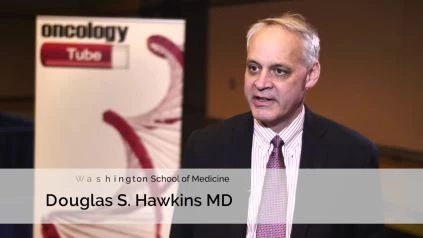Douglas S. Hawkins MD Of The University of Washington School of Medicine Discusses Larotrectinib Efficacy & Safety In Pediatric TRK Fusion Cancer Patients: 94% Of The Children Treated With Larotrectinib Achieved A Response.
BACKROUND:
TRK fusions involving NTRK1, NTRK2, and NTRK3 genes have been identified in a broad range of pediatric and adult malignancies. Larotrectinib, a highly-selective oral TRK inhibitor, was well tolerated and showed encouraging antitumor activity in 17 pediatric patients (pts) with TRK fusion cancer (Laetsch et al, Lancet Oncol 2018). Here, we present data on the clinical efficacy and safety of larotrectinib in 38 pediatric pts with TRK fusion cancer from an expanded dataset.
METHODS:
Pediatric pts enrolled in two larotrectinib clinical trials (NCT02637687, NCT02576431) with TRK fusion cancer detected by local testing were included; pts with primary CNS tumors were excluded from this report. Larotrectinib was administered until complete surgical resection, disease progression, withdrawal, or unacceptable toxicity. Disease status was investigator-assessed using RECIST v1.1. Data cutoff: July 30, 2018.
RESULTS:
As of July 30, 2018, 38 children and adolescents < 18 y with TRK fusion cancer were enrolled. Median age was 2.3 y (range 0.114.0); 14 (37%) were < 1 y. 18 (47%) had infantile fibrosarcoma, 15 (39%) other soft tissue sarcoma, 2 (5%) thyroid cancer and 1 (3%) each had gastrointestinal stromal tumor, melanoma, or mesoblastic nephroma. TRK fusions involved NTRK1, 2, and 3 in 18 (47%), 2 (5%), and 18 (47%) pts, respectively. Half of the pts had metastatic disease and half locally advanced disease at entry. 26 pts (68%) had received prior systemic therapy (median lines: 1 [range 04]) and 6 were treatment-naïve. In 34 evaluable pts, the overall response rate was 94%: 12 CRs, 18 confirmed PRs, and 2 PRs pending confirmation; 2 had stable disease. Median duration of response had not been reached (range 1.6+ to 26.7+ months); 84% > 1 y. At data cutoff, 28 pts (74%) remained on treatment; 4 pts discontinued due to complete surgical resection and 4 due to disease progression while on therapy, 2 of whom initially responded (PR). Adverse events were mostly grade 12.
CONCLUSIONS:
Larotrectinib treatment resulted in a high and durable response rate in pediatric pts with TRK fusion cancer together with a favorable safety profile. Routine testing for NTRK gene fusions in pediatric cancer pts is recommended in the appropriate clinical context. Clinical trial information: NCT02637687 and NCT02576431

